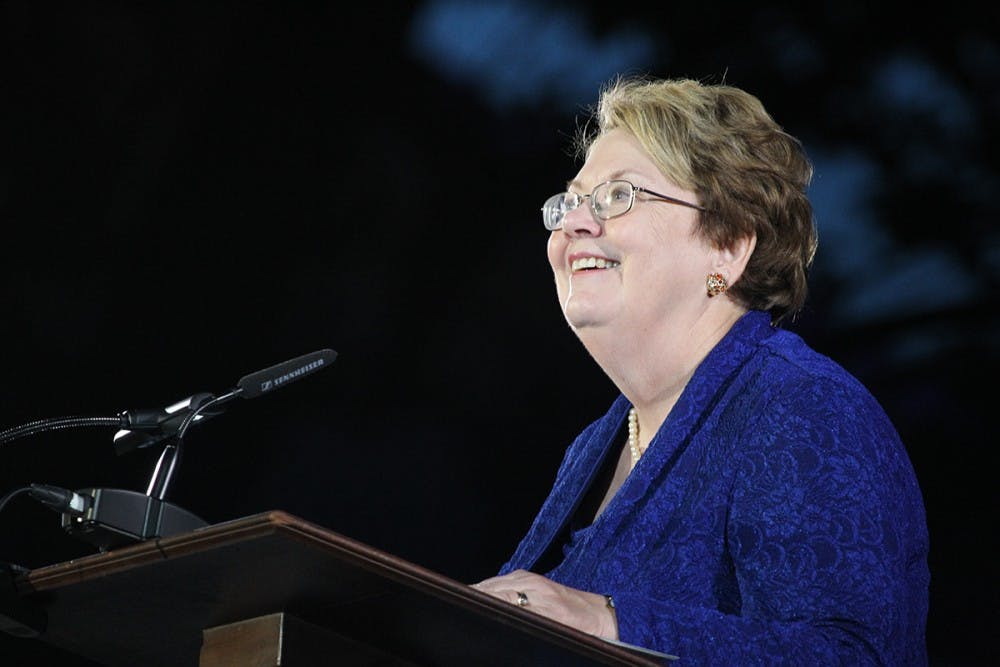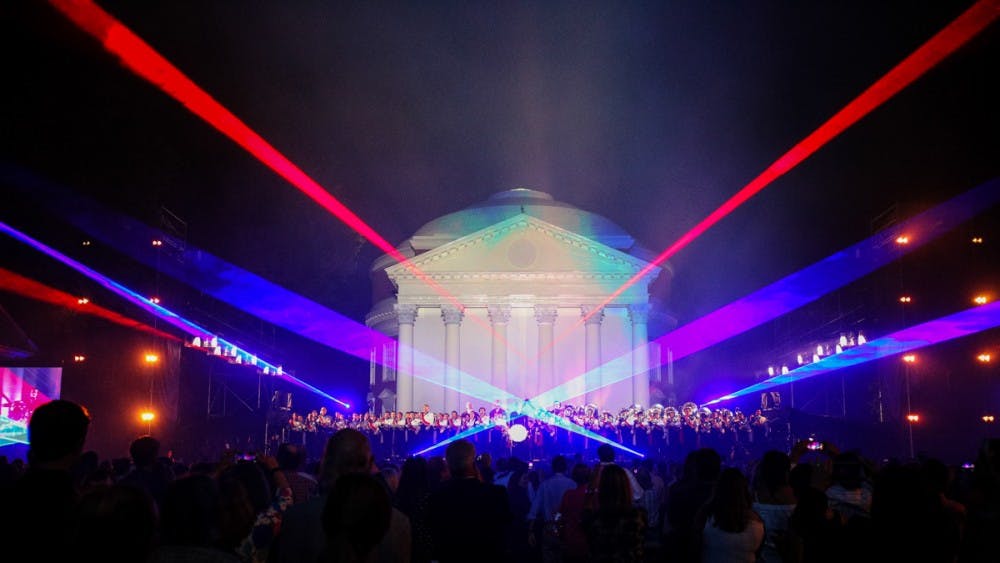The University initiated a two-year long celebration of its Bicentennial Friday night with a launch event held on the Lawn, which featured speeches and musical and artistic performances. The event also featured a telling of the University’s history since its founding through animated projections on the Rotunda.
Musical and artistic performances at the launch featured the Charlottesville Symphony, the University Singers, Janice Chandler-Eteme, Glenn Seven Allen, Bill Barker, Leslie Odom Jr., the Martha Graham Dance Company, the University Jazz Ensemble, Andra Day and a finale concert by the Goo Goo Dolls.
Speakers during the evening included Jody Kielbasa, vice provost of the arts and director of the Virginia Film Festival; University President Teresa Sullivan; Gov. Terry McAuliffe, Rector Frank M. “Rusty” Conner III, Sarah Kenny, a fourth-year College student and Student Council president; and Class of 1979 alumna Katie Couric.
Video by Courtney Stith and Katie McCracken
During Friday night’s events, three students were arrested by University Police for trespassing after they unfurled a banner reading “200 Years of White Supremacy” in front of a screen showing coverage of the Bicentennial.
Many of the speakers reflected upon the recent white nationalist violence of Aug. 11 and 12 in the Charlottesville and University community and spoke of the importance of the achievements and future of the University while acknowledging its troubled past.
“As we look back on our past, we will mark the imperfections of our history while celebrating all of our University’s achievements and all that we hold dear about our beloved University,” Kielbasa said. “The future holds great promise for the University of Virginia.”
In her remarks, Sullivan described the Bicentennial launch as a means of unifying the University community and looking forward to its future.
“The arts have a unique capacity to bring us together and to unify us as one people, one U.Va. family — we gather in that spirit tonight,” Sullivan said. “The launch of our bicentennial is a celebration of U.Va.’s past and an invitation to envision its future.”

Sullivan also emphasized the significance of viewing the future in the context of the past and noted the decision by the University Board of Visitors to construct the Memorial for Enslaved Laborers next to Brooks Hall.
“This memorial is an expression of our commitment to tell the full story of the University’s history as we celebrate today's great milestone and look to U.Va.’s third century,” Sullivan added.
McAuliffe said he was proud of the courage of the University community in retaliating against the white nationalist march on Grounds Aug. 11.
“In these 200 years, folks, we've seen ups and downs,” McAuliffe said. “It was a tough day for our city. We had haters come into our town, [but] that’s not who we were, [and] I told them to go home. They are not patriots, they are cowards. We don't stand for their like, and we won't tolerate it.”
McAuliffe also praised the student activists who stood up against the white nationalists on Grounds Aug. 11, claiming that the students “denied them that right” to march by the “beautiful statue of Thomas Jefferson.”
His description stood in a contrast to what some student activist groups have been vocally critical of in the aftermath of Aug. 11 and 12 — student activists have repeatedly protested the legacy of Jefferson at the University, and some shrouded the same Jefferson statue last month.
McAuliffe also emphasized the need for everyone at the University and in Virginia to continue to fight for justice and inclusion in the future.
“As we look to the next 200 years, we do have challenges,” McAuliffe said. “But Thomas Jefferson was a revolutionary, and you need to be one too. I need you to be a revolutionary for justice, for inclusion, for bringing people together to stop the movement of hatred together — that is the foundation of the University of Virginia and the Commonwealth of Virginia.”
Conner described the goal of the University as an educational institution to advance justice and equality in society.
“We seek to advance democracy in this next century, as we have in our first two, by educating citizen leaders in every field to ensure that the progress of this country continues the dream of Martin Luther King Jr. to bend the arc of history towards justice and equality,” Conner said. “This has been and continues to be our calling and inspirational force.”
Kenny described the University as an institution dedicated to the pursuit of democracy, which allows students from varying backgrounds to participate in that pursuit.
“From its very inception, the University of Virginia has produced generations of citizen leaders, trailblazers who view this world class education as a responsibility to contribute to the ongoing project of democracy,” Kenny said. “Students from all identities, backgrounds and disciplines coalesce around the dual callings of stewardship and advocacy, upholding both [sic] our timeless values of honor while also demanding action when provincial perspectives threaten to settle in our beloved institutions.”
Couric, known for her successful journalism career, came on to the stage as the presentation highlighted the switch of the University to a co-educational institution in 1970. The Rotunda featured a pink projection with female gender symbols.
“As many of you know, the University of Virginia went coed, finally, in 1970, and I think I speak on behalf of the more than 51 percent of the country when I say admitting women was the best thing that ever happened to the University of Virginia,” Couric said.
Couric said throughout her career she has been proud to say she graduated from the University.
“The values that I hold so dear and have tried to live by my entire life were given to me by mom and dad, but they were certainly fine-tuned and strengthened here at the University of Virginia,” Couric said.

The Charlottesville Symphony and University Singers started the night off powerfully with a joint performance of “We Hold These Truths,” with Bill Barker acting as Thomas Jefferson and reading excerpts from the Declaration of Independence.
Soon after, Leslie Odom Jr. took the main stage to enormous applause. He performed a few songs from the musical “Hamilton,” among them “Wait for It” and “The Room Where It Happens.”

He also addressed those in attendance and praised them for their strength in adversity.
“I have never in my lifetime seen a community rally like this,” Odom said. “You are rising to the occasion. I applaud you.”
Following this was a center stage performance of “How Deep is Your Love” by New Dominions and the Virginia Belles, and then another joint performance by the Charlottesville Symphony and the Martha Graham Dance Company of portions of “Appalachian Spring.”
Famed poet laureate Rita Dove took the stage to recite her poem “The Bell-Ringer.”
This was followed by performances by the U.Va. Jazz Ensemble and the MLK Community Choir, featuring performances from rapper Jay Willis and soul group The Ingramettes. They put on passionate renditions of “Glory” and “We Shall Overcome.”
Tina Fey, a Class of 1992 alumna and famed actress and comedian, made a video appearance to congratulate the University’s historic anniversary.
“For better or for worse, all eyes are on Charlottesville now,” she said.
Late in the evening, Andra Day took the stage in one of the most anticipated acts of the event.
“This isn’t just us playing or singing for you guys — this is a conversation,” she said, addressing the audience.
She was covered in glitter and wore gold handcuff bracelets on both wrists.
Day began her performance with a beautiful cover of Billie Holiday's classic protest song “Strange Fruit.” As she sang, the names of various lynching victims flashed on-screen behind her, along with the dates and locations of the acts.

She also performed her Grammy-nominated song “Rise Up,” dedicating it to students, faculty and alumni.
At one point in the song, Day paid tribute to those lost in the recent Las Vegas concert shooting.
“I would love to take a moment of silence or silent prayer for the victims and the families of the victims of the Vegas shooting,” she said. Her lips and hands moved in silent prayer in front of the microphone.
“Spread a little hope and love now … Encourage them to rise up now,” Day said at the end of “Rise Up.”
She finished her set with an incredibly soulful reworking of Queen’s “I Want It All.”
After Day finished, the Cavalier Marching Band took the stage. They performed a medley of the “Good Ol’ Song,” along with Bon Jovi’s “Livin’ on a Prayer” and other recognizable tunes.

When The Goo Goo Dolls finally took the stage for the “after-event,” much of the crowd had already filed out of the Lawn, but those who remained were clearly passionate fans of the band.
Their first performance was an extended, passionate version of new track “Tattered Edge / You Should Be Happy.”
This was followed by an impressive collection of new and old songs, including “Black Balloon,” “Slide” and “Iris.”
As an encore, they played an almost somber cover of Tom Petty’s “American Girl” in honor of the musician’s recent passing.








